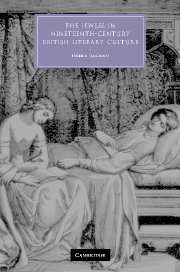Book contents
- Frontmatter
- Contents
- List of illustrations
- Acknowledgments
- 1 Introduction: the Jewess question
- 2 Repellent beauty: the liberal nation and the Jewess
- 3 Jewish persuasions: gender and the culture of conversion
- 4 Women of Israel: femininity, politics and Anglo-Jewish fiction
- 5 Hellenist heroines: commerce, culture and the Jewess
- 6 The shadow of the harem: fin-de-siècle racial romance
- 7 Conclusion: neither wild thing nor tame
- Notes
- Bibliography
- Index
- CAMBRIDGE STUDIES IN NINETEENTH-CENTURY LITERATURE AND CULTURE
2 - Repellent beauty: the liberal nation and the Jewess
Published online by Cambridge University Press: 10 December 2009
- Frontmatter
- Contents
- List of illustrations
- Acknowledgments
- 1 Introduction: the Jewess question
- 2 Repellent beauty: the liberal nation and the Jewess
- 3 Jewish persuasions: gender and the culture of conversion
- 4 Women of Israel: femininity, politics and Anglo-Jewish fiction
- 5 Hellenist heroines: commerce, culture and the Jewess
- 6 The shadow of the harem: fin-de-siècle racial romance
- 7 Conclusion: neither wild thing nor tame
- Notes
- Bibliography
- Index
- CAMBRIDGE STUDIES IN NINETEENTH-CENTURY LITERATURE AND CULTURE
Summary
‘The blind despiser of his fellow-creature for difference of rank and race, of clime and creed, knows he what he does? All are men, and, which the chosen, must be left to the decision of a more comprehensive judgment than was ever yet granted to Jew or Gentile.’ The concluding words of Character; or, Jew and Gentile: a Tale (1833) by the radical Unitarian feminist Mary Leman Grimstone affirm a universalist message of social equality and religious toleration. For Grimstone, this goal can be advanced by the cultivation of reason, sympathy and social feeling in ‘our domestic and public institutions’ and especially by improving education for the mothers of the nation. Like many other nineteenth-century literary demands for tolerance, however, Character relies not only on rational argument but also on affect. The author makes her case through Esther Mezrack, beautiful granddaughter of an open-minded but nonetheless ‘despised’ Jewish moneylender, who expresses in her ‘stately but unaffected mournfulness’ her grandfather's unmerited and unspoken suffering. Yet the emotional Esther ultimately shatters the progressive narrative structure and carefully orchestrated conclusion of Grimstone's novel. In the final pages, on discovering that her gentile lover has betrayed her, she kills him and herself in a jealous frenzy.
Persecuted and yet noble, magnanimous and yet loyal to her ancestral faith, the literary figure of the Jewess presented an undeniably affecting case for religious tolerance.
- Type
- Chapter
- Information
- Publisher: Cambridge University PressPrint publication year: 2007



